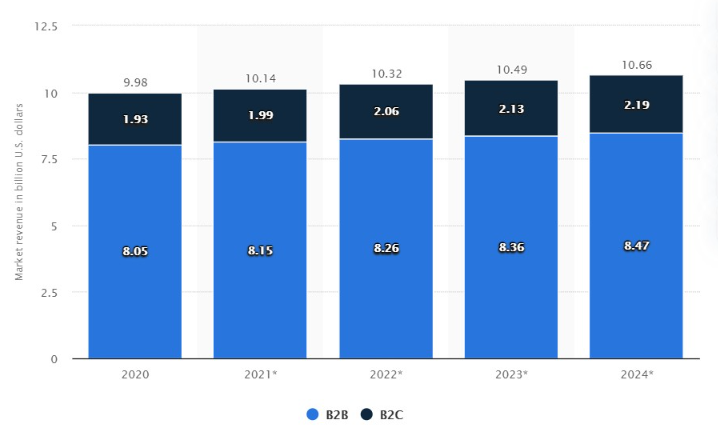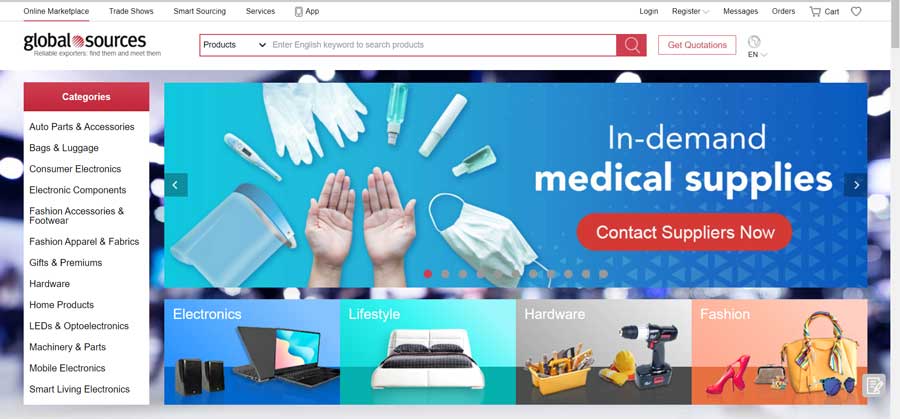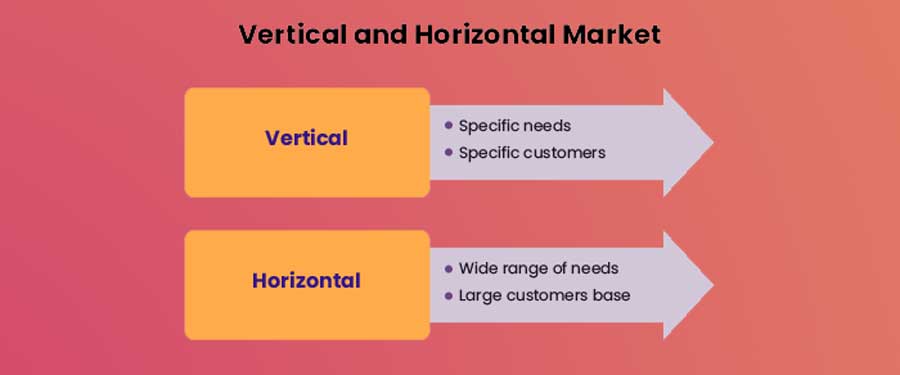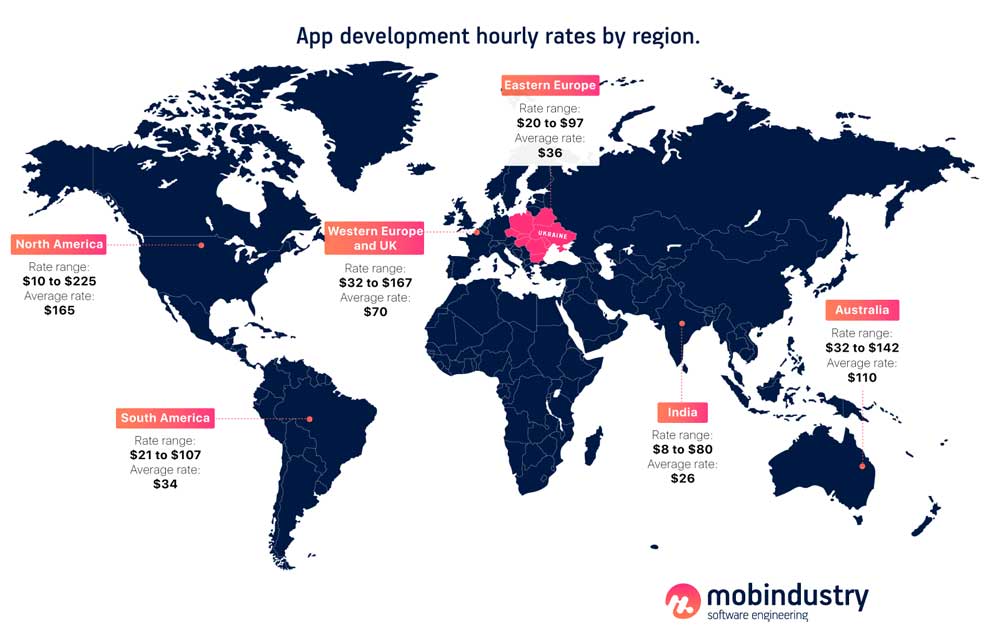How to Build a Successful B2B Marketplace in 2023
B2B marketplaces are less numerous than B2C marketplaces, but they’re certainly more lucrative. Learn how to build a B2B ecommerce marketplace in this article
B2B market overview
According to Business Wire, by 2027, the B2B ecommerce market will reach a mind-blowing $21 trillion in total annual revenue. The best way to enter this market and make a profit is to build a convenient marketplace where businesses can buy and sell equipment, materials, services, and venues.
Naturally, there are fewer B2B marketplaces than B2C marketplaces, and they’re also less advanced, often lacking user experience features that have already become standard for B2C ecommerce. However, B2B marketplaces are often more profitable than their B2C counterparts. Surely, this depends on what you’re selling.
But just consider this graph by Statista that shows B2C and B2B revenue from selling power-driven hand tools in the US in 2020 along with revenue projections through 2024.

As you can see, B2B sales of power-driven hand tools are expected to exceed B2C sales fourfold. Your goal as a marketplace owner is to make your marketplace a reliable and convenient mediator between businesses and allow them to easily sell and purchase products and services.
Currently, Alibaba and Amazon control a large portion of the worldwide B2B market, as they aggregate large wholesale businesses. However, new B2B marketplaces are constantly emerging, and they offer better user experiences than older platforms. Another secret of their success is a narrow focus, which makes them easier to market.
In this article, you’ll learn how to build a B2B platform successfully. We’ll discuss everything from B2B sales principles that will influence your user experience (UX) to B2B ecommerce app development details such as must-have features and technologies.
Types of B2B marketplaces and B2C vs B2B
There are many types of marketplaces, and one marketplace can often combine multiple types. AliExpress, for example, sells to both individuals and businesses.
Let’s quickly compare the most common types of marketplaces:
- B2B (business-to-business) — Businesses sell goods and services to each other
- B2C (business-to-consumer) — Businesses sell products or services to individuals
- C2C or P2P (consumer-to-consumer or peer-to-peer) — Individuals sell products or services to other individuals
Some businesses combine two types simultaneously. For example, Airbnb is a C2C platform that later allowed businesses to list their properties on the platform, making it also a B2C platform.
The biggest differences that distinguish B2B from B2C are:
- Volume and cost of orders: B2B orders tend to be more expensive
- Marketing strategies: B2C marketing encourages more emotional purchases
- Decision-making: B2B purchases involve a longer decision-making process that often involves more than one person
- Purchase process: B2B has a more complex purchasing process that usually involves transactions between legal entities
All these differences should be reflected in your product. They are also the reason modern B2B marketplaces occupy narrow niches. Payment and decision-making processes can vary greatly across industries, so one size won’t fit all.
Let’s talk about the basic types of B2B marketplaces and services depending on what they sell and to whom.
1. Product marketplace. This is the most widespread type of B2B marketplace, where businesses can find equipment, raw materials, spare parts, and any other products. Alibaba is one of the biggest product marketplaces in the world, offering goods for any kind of business.

2. Service marketplace. Here, businesses can get services from other businesses, including everything from recruiting talent or catering a corporate event to creating a promotional video or having a professional corporate photoshoot. Upwork is a service marketplace that helps businesses find any kind of service, from B2B marketplace software development to design.
3. Procurement marketplace. This type of marketplace allows organizations, government agencies, and businesses to buy office supplies, equipment, and other goods like furniture and clothing. It’s typically cheaper and easier to order such products through procurement marketplaces because they usually take care of everything from invoices, orders, and warranties to transaction histories.
4. Commercial real estate marketplace. Here businesses can rent office or coworking spaces, warehouses, and event venues. GorillaSpace and Office Genie are examples of marketplaces of this type.

Your first step in B2B marketplace development is to choose which type of marketplace you want to make depending on what products or services you’re going to focus on. Here is where you’ll also need to decide if you want to create a general or a specialized marketplace.
General (horizontal) marketplaces offer all kinds of products and services to businesses in various industries. These marketplaces were the first that appeared, and now they are the largest players on the B2B market. For example, Aliaba and Amazon are general marketplaces where you can find equipment for virtually any type of business.

Specialized (vertical) marketplaces appeared later, when it became clear that competing with large general marketplaces is hard. These marketplaces are smaller, and usually they offer products or services for a specific domain. Typically, B2B vertical marketplaces are more convenient because they make it easier for clients to find suppliers.
Matching clients with suppliers is the biggest challenge for general marketplaces, as the variety of products is too large. Also, general marketplaces often have one set of features that facilitate the purchase process, and those features may not suit every business. An average vertical B2B marketplace usually delivers more relevant and convenient service.
According to Digital Commerce 360, vertical marketplaces are becoming a big driver of B2B commerce, with 70 B2B marketplaces in over 13 industries today.
The biggest advantage of a vertical marketplace is its narrow focus for a particular type of business that allows it to create new ecommerce tools. These tools can be specific for an industry, allowing businesses to set up and manage their accounts easily, customize orders, receive detailed invoices, and monitor their spending.
The biggest advantage of a vertical marketplace is its narrow focus for a particular type of business
Businesses value that vertical marketplaces help them save time, so they’re more likely to choose a smaller marketplace with specific, unique products. Though it may seem that building a universal marketplace is better because you’ll have a larger audience, competing with Alibaba or Amazon is nearly impossible for new brands. My advice is to start with a small marketplace with a narrow focus that will be easier to market to a specific group of businesses.
If you decide to choose a narrow niche for your marketplace, you need to figure out what businesses will sell products or services on your marketplace. Let’s discuss the types of marketplaces according to products they are trading.
- Fashion apparel and decor
- Equipment
- Automotive
- Food (catering, business lunches)
- Chemicals
- Agriculture (machinery, seeds)
- Healthcare (medicine, medical equipment)
- Raw materials
You can go even further and narrow down to specific products like:
- Wine
- Aerospace parts
- Metals
- Flowers
- Meat
As you can see, you can create a narrowly focused marketplace and gradually expand it if you feel the need.
Let’s talk about the challenges of a B2B marketplace platform and how you can overcome them before you even start development.
B2B marketplace challenges
It’s best to think about the challenges of a marketplace business before you begin development. This way, you’ll be able to predict them and build your product accordingly. So what are the biggest challenges of B2B marketplace development?
1. Marketing and finding the first users
The biggest challenge for a marketplace is to simultaneously attract sellers and buyers. What can you actually sell on a B2B marketplace, and what groups of manufacturers should you invite?
Surely, it’s best to attract sellers first, because there will be no buyers without products. However, it’s challenging for any kind of marketplace to encourage the first sellers to list their products.
My advice is to:
- Do market research and define the main players (buyers and sellers) and their interaction patterns
- Network and find one to three seller partners before you start developing your platform
2. Complex transactions
As a platform, you need to support your buyers and sellers at each step of the purchasing process and facilitate safe, reliable, and convenient transactions. Convenience means transactions that are frictionless for businesses. This may include types of transactions that are very different from those on B2C marketplaces, including:
- Bank transfers
- Paper checks
- Credit card payments
- Wire transfers
Figure out what types of transactions are the most common in your target market and plan to integrate them in your marketplace. You should also pay attention to other requirements like payment types, credit terms, billing, and invoicing.
The whole process of making a decision and placing an order is also more complex in B2B sales than it is in B2C, and you need to facilitate it from beginning to end — from the RFP (request for proposal) and negotiation to the contract.
You should require certifications and verifications from sellers that are needed to confirm the quality of their products or services, create estimates, sign NDAs, and so on.
To make the transaction process smooth, you need to know the transaction flow from A to Z and have a clear pipeline that’s reflected in the user experience. To make this happen, you’ll need three things:
- Domain expertise
- Great product management skills
- A professional UX designer
As a platform owner, you don’t need to possess all these skills, but surely you need to hire developers and designers who will be able to combine domain expertise with the latest technologies.
3. Trust building
Trust is everything in B2B, and it takes years of networking, building partnerships, and exchanging products and services fairly to build trust. Your goal as an owner is to shift existing trusting relationships to your platform and make interactions between established partners more convenient.
B2B transactions are risky: Any delay or purchase failure can cost a business thousands or millions of dollars because of a failed project. That’s why a marketplace should be seen as a guarantee that a deal will go smoothly and happen on time.
The high order value and cost of B2B sales also puts extra responsibility on your shoulders as a facilitator, so you need to make sure that your marketplace is secure and free of fraud.
Now, let’s talk about how B2B marketplace creators monetize their businesses.
How to monetize your B2B marketplace
Though B2B marketplace development is still a blue ocean and the B2B sector is far from the level of B2C market saturation, there are already known best practices for B2B marketplace monetization. All B2B marketplaces work according to one of three major business models:
- Commissions
- Subscriptions
- Advertisements
Commission-based marketplaces charge either sellers or buyers (or often both) for each transaction. This B2B marketplace business model is common for B2C and also freelance platforms, from which you can get inspiration.
Commissions can be either a percentage or a fixed amount per transaction. For example, Fiverr, a freelance platform that brings freelancers and businesses together, charges 20% commission from both buyers and sellers after each transaction. Toptal, a hiring platform, charges $500 to sign up, plus a service fee.
A commission-based model is the most popular strategy for B2B marketplaces that sell services.
Subscription-based marketplaces charge a fixed fee each month or year, depending on the model. Often, the longer the subscription, the cheaper it is per month. You also have options within the subscription model: For example, you can charge buyers or sellers a registration fee, but it’s not the best strategy at the very beginning because your potential users will want to be absolutely sure the registration cost is worth it.
A better way to attract clients without charging them at the very beginning is using the freemium model: Offer your basic features for free and tempt users with advanced functionality and perks they can get with a paid subscription.
Paid membership will allow you to get loyal customers that you’ll be able to upsell. If you want to focus on long-term relationships with your business buyers and sellers, subscriptions are great.
Many marketplaces choose the freemium strategy: they offer basic features for free and tempt users with advanced functionality and perks they can get with a paid subscription
Marketplaces that rely on monetization through advertising are usually ecommerce platforms that have tough competition between sellers. Here, sellers can pay the marketplace to keep their products at the top of the search results, get noticed, and appear in special sections of the website such as “Recommended” or “Top sellers.”
Also, a platform can charge for adding many listings. Alibaba, for example, allows sellers to post 50 listings for free and charges for more. OLX, which is a mixed marketplace with both businesses and individual sellers, charges for making many listings in a single category and also has multiple advertising plans.
Advertising inside a platform can be either your main monetization strategy or can be mixed with the other strategies I already mentioned. At any rate, you need to think about how you’re going to monetize your B2B marketplace before you start development, since monetization requires you to integrate special functionality from the start.
Let’s now talk about the functionality that’s absolutely necessary for your B2B marketplace.
How to build a B2B marketplace: must-have features
B2B marketplaces are different from B2C or C2C marketplaces, and you’ll need to think about the unique needs of both buyers and sellers to build a successful platform. Let’s talk about the unique B2B marketplace features that will influence its functionality.
1. Your buyers will make bulk purchases, so you need to include both a detailed description of each product and the quantity available.
2. Often, sellers will want to work with buyers starting with a minimum order quantity, so make sure to build a feature that supports this.
3. You’ll need to integrate a complex discount algorithm that will determine discounts based on order value or quantity.
4. You’ll need to provide buyers and sellers with a negotiating mechanism if there’s no set price for a product. Offers are great in this case.
5. Your B2B marketplace should accept different payment options, from cash and credit cards to checks and bank transfers.
6. Installment payments should be available for massive orders.
7. You need to be careful about showing sensitive data like price and product specifications to prevent fraud.
Also, just like any other platform, a B2B marketplace requires two types of profiles and two feature sets: one for buyers and one for sellers. Most marketplaces allow the same user to switch between buyer and seller profiles.
You’ll also need an admin panel to manage your platform, provide support to your users, and check the platform’s analytics. Keeping all this in mind, let’s discuss the features you’ll need for your B2B platform.
1. Registration and onboarding
The process of registering on a platform will be different for buyers and sellers. While buyers will only need to authenticate, sellers should prove their legitimacy and provide everything from tax information to certificates, licenses, and business registration data, which you’ll need to check manually through vetting software.
2. Buyer/seller profiles
In profiles, buyers should be able to see all information about their purchases, such as current orders, order histories, and so on. They should also be able to change settings and manage their payment information.
Sellers should be able to use their profiles to manage their orders, company information, payment and shipment methods, finances, and so on.
Both buyer and seller profiles should provide quick access to communication tools, which are most often text-based chats.
3. Product listings
A product listing should include full information about the product: a description, specifications, price, quantity available, minimum size order, and all other details a buyer might be interested in, along with photos and videos.
4. Search and filters

Implementing predictable search and advanced filters is vital for a B2B platform, as these will likely be the two most used features on your platform. Filters should include categories, characteristics, minimum order size, and even ratings for the best user experience.
5. Product comparison
After a buyer adds products to their favorites, help them make a final decision and compare products side by side according to their characteristics. This useful feature will make the decision process easier for buyers and facilitate orders.
6. Personal recommendations
This feature is often situated on the main screen of a B2B platform, showcasing top products. Personal recommendations should help your buyers find suppliers faster. You can base recommendations on:
- Previous orders
- Frequent searches
- Preferences and interests
- Industry
- Location
7. Payment options
You should have multiple payment processors on your platform that cover all possible payment options. Study the market and figure out which payment processors are most popular among your target market, as the popularity and availability of payment platforms varies regionally. You should also know about potential delays if you support payment through bank transfers and should warn your users about them.
I’d suggest adding an international gateway like PayPal and a local gateway depending on your location.
8. Pricing and discounts
B2B pricing and discount logic are very different from B2C pricing. Make sure your pricing algorithms work perfectly and take into account everything from order size, quantity, urgency, and shipment to individual discounts discussed privately between a buyer and a seller.
Integrate tools like:
- Requests for quotation
- Personal offers
- Dynamic pricing
9. Shipping options
Your platform should offer multiple shipping options to buyers. Partner with local and international shipping companies that will help your sellers manage their shipments. Though sellers will most likely be responsible for a shipment if something goes wrong, buyers will blame your marketplace for it.
Integrate with ERPs of the most popular shipping companies to provide accurate shipping information to both buyers and sellers.
10. Ratings and reviews

Trust is imperative in B2B relationships, so you need to implement two-way ratings and reviews that will help sellers and buyers trust each other. Make sure that both parties can leave reviews only after a deal, and make sure your admins manually check reviews for accuracy.
11. Third-party integrations
Your platform should be easy to integrate with your user’s enterprise resource planning (ERP) systems so users can easily sync their sales and order data with your marketplace and optimize their accounting and supply chain management. Learn what ERPs are the most popular with your target audience. Major ERPs you can integrate include Coupa, SAP, Oracle, and Workday.
12. Admin panel
Through an admin panel, you should be able to:
- Manage platform content
- Access all user data and manage user profiles
- Add and edit blog posts
- Manage fees and discounts and view revenue from all monetization sources
- Manage all third-party integrations
- Access all insights and statistics on platform performance
- Send notifications and alerts to users
How much does it cost to build a B2B marketplace?
A B2B marketplace requires a long preparation time and advanced development and product design skills. Though the B2B market sphere is far from saturated, it has extremely high quality standards, especially if you want to build a B2B marketplace with a narrow focus that businesses will choose over market behemoths like Alibaba and Amazon.

The cost of building a B2B marketplace will depend on several factors:
- Marketplace size and complexity
- Feature set
- Tech stack
- Design complexity
- Your developer’s hourly rate
- Your development team’s location
As you can see, there are many factors that play into the cost of developing a B2B marketplace. The hourly rate of your development team will mostly depend on their location, and this influences the price the most. The cost of development can vary up to 5x across countries.
At Mobindustry, we have experience working with B2B platforms and have built Allo.ua, one of the largest ecommerce websites in Ukraine. If you want to get a development quote for your project, feel free to contact us. We’ll analyze your business needs, suggest marketplace development best practices, and help you plan the whole process from technical specifications to launch and further maintenance and support.


